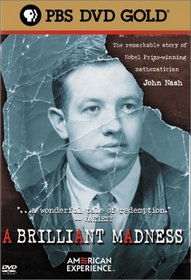| Actors: Sylvia Nasar, Alicia Nash, John Nash, Liev Schreiber Director: Mark Samels Creators: Peter Donahue, Mark Samels, Karen Schmeer, Greg Shea, James E. Dunford, Margaret Drain, Melissa Martin, Randall MacLowry, Rose M. Compagine, Susan Mottau Genres: Documentary, Mystery & Suspense, Military & War Sub-Genres: Biography, History, Mystery & Suspense, Military & War Studio: PBS Home Video Format: DVD - Color - Closed-captioned DVD Release Date: 06/25/2002 Original Release Date: 04/28/2002 Theatrical Release Date: 04/28/2002 Release Year: 2002 Run Time: 1hr 0min Screens: Color Number of Discs: 1 SwapaDVD Credits: 1 Total Copies: 0 Members Wishing: 2 MPAA Rating: NR (Not Rated) Languages: English |
Search - American Experience: A Brilliant Madness on DVD
  | American Experience A Brilliant Madness Actors: Sylvia Nasar, Alicia Nash, John Nash, Liev Schreiber Director: Mark Samels Genres: Documentary, Mystery & Suspense, Military & War NR 2002 1hr 0min |
Larger Image |
Movie Details
We're sorry, our database doesn't have DVD description information for this item. Click here to check Amazon's database -- you can return to this page by closing the new browser tab/window if you want to obtain the DVD from SwapaDVD.
Click here to submit a DVD description for approval.
Similar Movies
Similarly Requested DVDs
|
Movie ReviewsSee this one instead. R. Becker | Ross, CA United States | 04/02/2004 (5 out of 5 stars) "If the film A Beautiful Mind left you non-plussed, don't worry. Where Beautiful Mind was strewn with Hollywood concocted implausibilities and only hinted at the real, far more interesting story of John Nash, this *is* the real story and in this case, the real story is about 50 times more interesting than Hollywood's tricked up version. Where I didn't really care for Beautiful Mind, I found this documentary riveting. One of my favorite films, it is a fascinating study of a unique individual, his affliction, and his gift. And if you liked the Holywood version, you will still love having the holes in that story filled. Highest recommendation." Fuller picture eclectictastes | Columbus, OH USA | 01/30/2003 (5 out of 5 stars) "This is a good work to watch after seeing the Ron Howard film. It gives a fuller picture of John Nash's life and trials. Nash comes off as the typical eccentric professor one encounters in university settings but he's very likable. You don't have to be a math and economics expert to be in awe of Nash's accomplishments. You will also admire his friends and family's dedication during his roughest periods.My only annoynance was the commentary. The filmmakers seemed to be too caught up in the technical aspects of the film such as lighting, camera work, etc. It just seemed out of place for a documentary." A tale of triumph in two extraordinary ways Charles Ashbacher | Marion, Iowa United States(cashbacher@yahoo.com) | 06/03/2006 (5 out of 5 stars) "This tape is a remarkable success story on two separate levels. The first is the brilliance of the mathematics that led to John Nash earning a Nobel Prize in economics. In the second case, it is a triumph over an incredibly debilitating mental illness. When he was twenty, Nash did the work that would eventually win him the highest honor of science, and at the age of thirty he began suffering from mental illness. He believed that he was receiving communications from aliens, thought that he had been named Emperor of Antarctica and became obsessed with the idea of secret messages. This led to him being unable to do any mathematical work or teaching. His colleagues and his wife did what they could to help him and he was hospitalized for mental illness. The scenes of the therapy he received are unnerving. The sight of the patients undergoing insulin therapy and being turned into the human equivalent of a limp sponge is very disturbing. Fortunately, Nash suddenly found the will and strength to rise up from the depths of his illness. It took years, but he finally reached the point where he once again could become a functional member of the mathematical community and personally receive his award. Nash, his mathematical colleagues and their spouses, and his wife and children are all heavily interviewed on this tape. Nash in particular is brutally honest in his discussions, at one point saying, "Madness can be an escape. In madness, I thought I was the most important person in the world." His wife and child are also very candid, from her words, you know the depth of his wife's frustration as she tried to cope with John as his mind was going elsewhere. This is one of those tapes that will raise the following question in your mind. "How much distance is there between genius and insanity?" Clearly, at different points in his life, John Nash displayed both and this is an accurate chronicle of his personal journey between them. His life was the genesis for the award winning movie, "A Beautiful Mind", but I consider this tape to be better than the movie. For when you listen to the people who had to deal with Nash in his periods of insanity, it all becomes real to you. I strongly recommend this movie and will show it in my class if I ever again teach a course in the history of mathematics. " A tribute to human spirit, endurance, and goodwill Michael D. Fahey | Half Moon Bay, CA USA | 10/03/2005 (5 out of 5 stars) "This explanation of John Nash's life is better and more inspiring than the movie version (Beautiful Mind).
It displays a wonderful (though apparentlly immensely painful) transformation of a genius, fixated on accolades and self fulfillment, to a truly generous, forthright, and caring person who ultimately got the acclaim he desired. It is also a poignant and deserved tribute to the endurance of those who loved and cared for him. It brings to mind thoughts of Godly redemption. Hurray for John Nash and his family and friends." |














